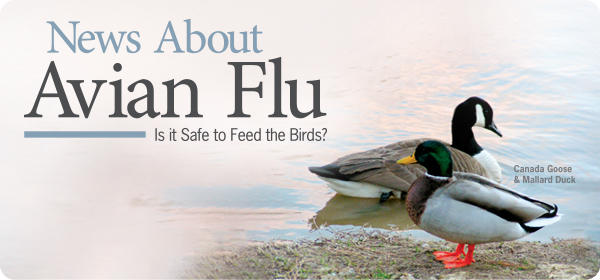
What You Need to Know
You may have heard about avian influenza (or “bird flu”) and the development of this disease in North America. At this point in time, wildlife and health experts say you may continue feeding the birds. Here are the facts as we know them today.
Since Fall of 2021, a highly pathogenic avian influenza (HPAI H5N1) has been detected in numerous outbreaks in North America. It is a naturally-occurring virus especially prevalent among wild aquatic birds such as ducks, geese and shorebirds and has been shown to affect commercial and backyard poultry with high mortality.
Susan Kirks, of the Madrone Audubon Society, updated information about the disease among wild birds in the September 2022 edition of their newsletter, Madrone Leaves. "At this time the consensus nationally and regionally is there is low risk of avian influenza to songbirds. This summer has been devastatingly hot and dry and birds and wildlife need access to water and food sources. Keeping your feeders filled, clean underneath for any loose seeds or feces, and keeping fresh water available in saucers, birds baths, and cleaning these water sources regularly, at least 2-3 times weekly, will support our songbirds who are already direly stressed. Fall migrants are also beginning to arrive and are going to need food sources and water. Therefore, we agree with Native Songbird Care & Conservation to support our songbird populations as much as possible and to clean feeder areas and water sources regularly. If you reside next to a domestically kept bird population, known as "poultry", do take extra precautions. Our Bird Rescue Center of Sonoma County has given strong warnings about the avian flu outbreak in our county and reviewing their website information can also give guidance. But, the songbird populations are not considered to be at high risk and we suggest you take a look at your individual circumstance where your reside, what's nearby and around your locale of bird feeders and water sources. Do whatever you can to support our migratory birds and wildlife, safely while staying up-to-date."
However, according to the Cornell University Wildlife Health Lab, “Passerines [song birds] do not seem susceptible to HPAI and are not thought to play a significant role in spreading this virus. We are not recommending removal of bird feeders at this point.”
And the Institute for Infectious and Zoonotic Diseases at U Penn Vet School states, “According to the USDA, there is no evidence that birdfeeders, or the birds that frequent them, contribute to the spread of HPAI.”
The US Department of Agriculture further states, “HPAI viruses and the illness they cause are not commonly found in wild birds…removing backyard feeders is not somethings USDA specifically recommends to prevent avian influenza unless you also take care of poultry.” Also, the Government of Canada affirms, “The use of bird feeders is still safe but they should be removed from areas that are open to poultry and other domestic animals.”
In addition, the US Centers for Disease Control and Prevention and the Public Health Agency of Canada currently deem H5N1 to be of low human health risk.
To practice the hobby of bird feeding safely and to ensure the birds’ overall health, it is always recommended you clean your bird feeders regularly with a solution of one part bleach and nine parts water.

